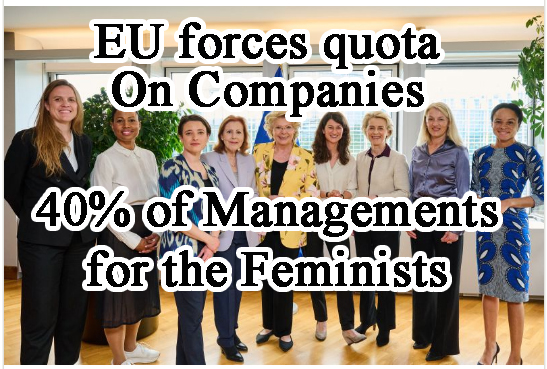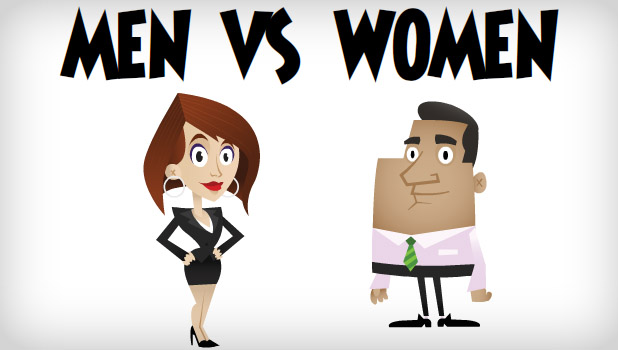The EU Forcing a 40% Quota for Women in Companies Managements

This is a great day for women in Europe.
And it’s also a great day for companies.Finally, after a decade of deadlock, we have an EU agreement on our proposal for gender balance on corporate boards!
Currently, only 8.5% of board chairs in the EU are women. The objective with our new measures? At least 40% of non-executive directors or 33% for all board members by 2027 held by members of the under-represented gender.
We are breaking the glass ceiling preventing talented women from acceding to boards. This is also good for companies as studies show that embracing diversity brings more growth and innovation!
📷 From left to right: Terry Reidtke, Alice Bah Kuhnke, Karen Melchior, Maria Da Graça Carvalho, Viviane Reding, Lara Wolters, Ursula Von Der Leyen, Evelyn Regner and Samira Rafaela. These are some of the policy-makers who have engaged strongly so that this proposal could become a legal reality.
It is a sad day for entrepreneurship and to idea of meritocracy. The president of the European Commission, Ursula Von Der Leyen have celebrated with fellow feminist lawmakers, the regulations that would force women into management positions in private and public companies.
Yes, a governmental structure is meddling with private companies and dictating a quota that they should abide by. Something imaginable in a free market capitalist system.
The regulation require that within 5 years, at least 40% of directors and 33% of board members to be women (they tried to sugar coat it, calling it under-represented gender).
The EU is no stranger to stupid business decisions. Take for example the “cookies” regulation, that forces websites to display a banner message informing visitors about cookies. People do not even care or read those messages, especially given that the visitor have no other option.
What does the 40% directors and 33% of boards quota really mean?
1- Discrimination against males that are by far the highest percentage of entrepreneurs.
I look at this from a parent point of view, would i want my boy to have less a chance simply because he is a boy, life is already unfair for boys, should we make it even more unfair ?
When you have 10 boys and 10 girls and choose 2 from each that’s fair, but when you have 8 boys and 2 girls and choose 2 from each that’s discrimination and favoritism.
Men are more risk taking, and thus there are a bigger percentage of men entrepreneurs than women entrepreneurs. This implies the entrepreneurship and investment experience is far more present in the male population than in female’s.
To give you some numbers, in a world bank study of newly registered LLC companies from 2014 to 2018 (hence entrepreneurs):
In Germany, 14.6% only were by female entrepreneurs, and 85.4% were by male entrepreneurs.
In Italy, 21.2% only were by female entrepreneurs, and 78.8% were by male entrepreneurs.
In Denmark, 20.5% only were by female entrepreneurs, and 79.5% were by male entrepreneurs.
In Netherlands, 17.8% only were by female entrepreneurs, and 82.2% were by male entrepreneurs.
In Norway, 23.8% only were by female entrepreneurs, and 76.2% were by male entrepreneurs.
Thus back to the original idea, when you have a 20/80 split or 1 woman for every 4 men, you can not ask for a 40% quota, because it would mean that each woman is worth twice her actual representation in the entrepreneurship landscape. Or a woman’s value is trice the man’s. This is not positive discrimination, this is gender favoritism. This is discrimination against men.
(to be more precise: 20% of population get 40% of positions, while 80% gets 60% of positions, translates to women getting twice (2x) their representation and men getting 0.75 their representation, thus each women is almost as valuable as 3 men)
2- An identity politics game that could slow companies.
Anyone who have run a company, or worked in a functional one, knows that the best way for a company to succeed is to put the right person in the right place. Have managers and directors that understand and can communicate with their teams, and not force an agenda based on gender or other. It does not matter if you are a male, female or a polar bear as long as you are the right fit. Having to fulfill the requirement means filling spots with sub-optimal results just to fill the quota.
(Hint: You can create fake directors position, just as a quick workaround … director of parking, director of stationary ;))
3- A quota driven promotions would break a company.
Nothing hurt a company more than losing talent, and that what would happen when top talent notice that they are being passed over for promotion, because there is a gender agenda that the company should abide by.
And as i mentioned in point 1, men are entrepreneurs, burn the wrong guy and you’ll see a competitor popping up next door.
4- A gender quota undermines the effort done by great female managers .
Prior to the me too movement, when you would see an under-qualified female getting top positions in a company, people generally assumed that there is a secretive relationship with the boss. Thankfully the me too movement made this kind of behavior unacceptable, thus allowing women to show that the positions they get are based on merit not being the boss favorite.
This gender quota, throws women back to the pre-me too era. Being a manager/ director / board member who everyone see as the result of a bureaucratic quota rather than well deserved merit, is no fun.
Who are the women behind such a genius plan? And how much do they know about business and entrepreneurship?
| Name | Position & Background & Experience | Real Business Experience |
| Ursula Von Der Leyen | Politician since 2003 president of the European Commission | 4 years as assistant physician at a Women’s Clinic |
| Terry Reidtke | Politicians since 2014 (at 27) | No visible trace |
| Alice Bah Kuhnke | TV /NGO/Politician | Served on the board of a small internet design firm, Doberman |
| Karen Melchior | Politician since 2014 (at 32) | Lawyer |
| Maria Da Graça Carvalho | Academic / Politician | No visible trace |
| Viviane Reding | Politician since 1979 (at 28) | Member of board on few multinationals. But no trace of being involved in a business. |
| Lara Wolters | Politician since 2020 | No visible trace |
| Evelyn Regner | Politician since 2009 | Lawyer |
| Samira Rafaela | Politician since 2019 | No visible trace |
The table above only showing the people mentioned in the picture … and no surprise there, they are all politicians, with almost all of them having no real work experience at least not in corporations or multinationals. None of them is an entrepreneur, to what i have found so far … and yet they push quotas on businesses.
It’s a feminism issue not a business issue.
Business was always about optimizing capital gains, gender do not really play a role. Here with this regulation it is not about opening doors for women, it is about feminism, especially the new wave of feminism that have been sending a message to men since some time, which says “what’s mine is mine, and half what’s yours is mine“.
Unfortunately, the vast majority of women support such feminist shenanigans, and see no issues with such a quota:
How do women see the gender quota plan?








